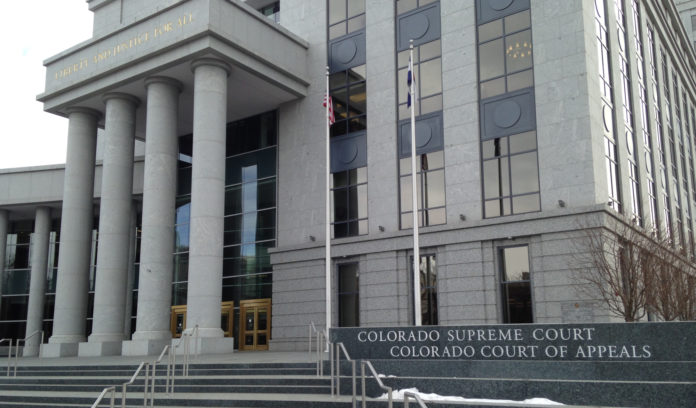
Editor’s Note: Law Week Colorado edits court opinion summaries for style and, when necessary, length.
People v. Pham
After watching Tien Dinh Pham’s vehicle drive away from a house in an allegedly high-crime area, Lakewood police agents began following him, observed a lane change violation and initiated a traffic stop. Pham pulled into a parking lot, where the agents ordered him out of the vehicle.
Although it appears that Pham initially opened the door from inside the car, the agent at the door immediately put his hand on the top of the car door. Pham then got out of the car, and the agent conducted a brief pat-down and quickly directed Pham to a different location in the parking lot, leaving the car door open.
Agent Kyle Winters then deployed drug-detection dog Duke and directed the dog to conduct a free-air sniff of Pham’s vehicle. When the dog got to the open driver’s side door, Winters partially closed the door to allow him and the dog to maneuver around it. Winters then reopened the door sufficiently to allow the dog to place his head and front paws inside the vehicle, at which point the dog alerted to the presence of drugs.
After the dog did so, Winters walked the dog around the rest of the car, and the dog didn’t alert again until he returned to the open door. The agents on the scene searched the vehicle and found, among other things, suspected methamphetamine, cocaine, heroin, drug paraphernalia and two handguns. Officers then arrested Pham.
The Jefferson County district attorney charged Pham with nine counts, including possession with intent to manufacture or distribute a controlled substance, possession of a weapon by a previous offender and possession of drug paraphernalia.
Pham moved to suppress the evidence seized as a result of the traffic stop, arguing, among other things, that the law enforcement officers had no basis to remove him from his vehicle and that the dog sniff of his vehicle was an unconstitutional search because it was conducted without probable cause.
The trial court held a suppression hearing and concluded that the search was unconstitutional because the officers had no reason to remove Pham from his vehicle and acted improperly when they intentionally left the vehicle door open so that the dog could sniff inside the vehicle.
In this interlocutory appeal, the prosecution asked the Colorado Supreme Court to reverse the trial court’s order suppressing the results of a police dog sniff search of the interior of Pham’s vehicle.
The court concluded that although the trial court erred in finding that removing Pham from his vehicle during a lawful traffic stop was a search, the court correctly determined that the dog’s entry into Pham’s vehicle, which was facilitated by the police, was a search under the Fourth Amendment and that this search was conducted without the requisite probable cause.
The state Supreme Court affirmed the trial court’s suppression order.
Justice Richard Gabriel, joined by Chief Justice Monica Márquez, dissented. The dissenting justices noted the officers adhered to “the prevailing standards governing how to properly conduct a K-9 drug sniff when a vehicle’s occupant leaves its doors or windows open, as Tien Dinh Pham did here.”
“Because Pham left his car door open, the agents’ leaving it open did not ‘facilitate’ Duke’s entry,” the dissent explained.

